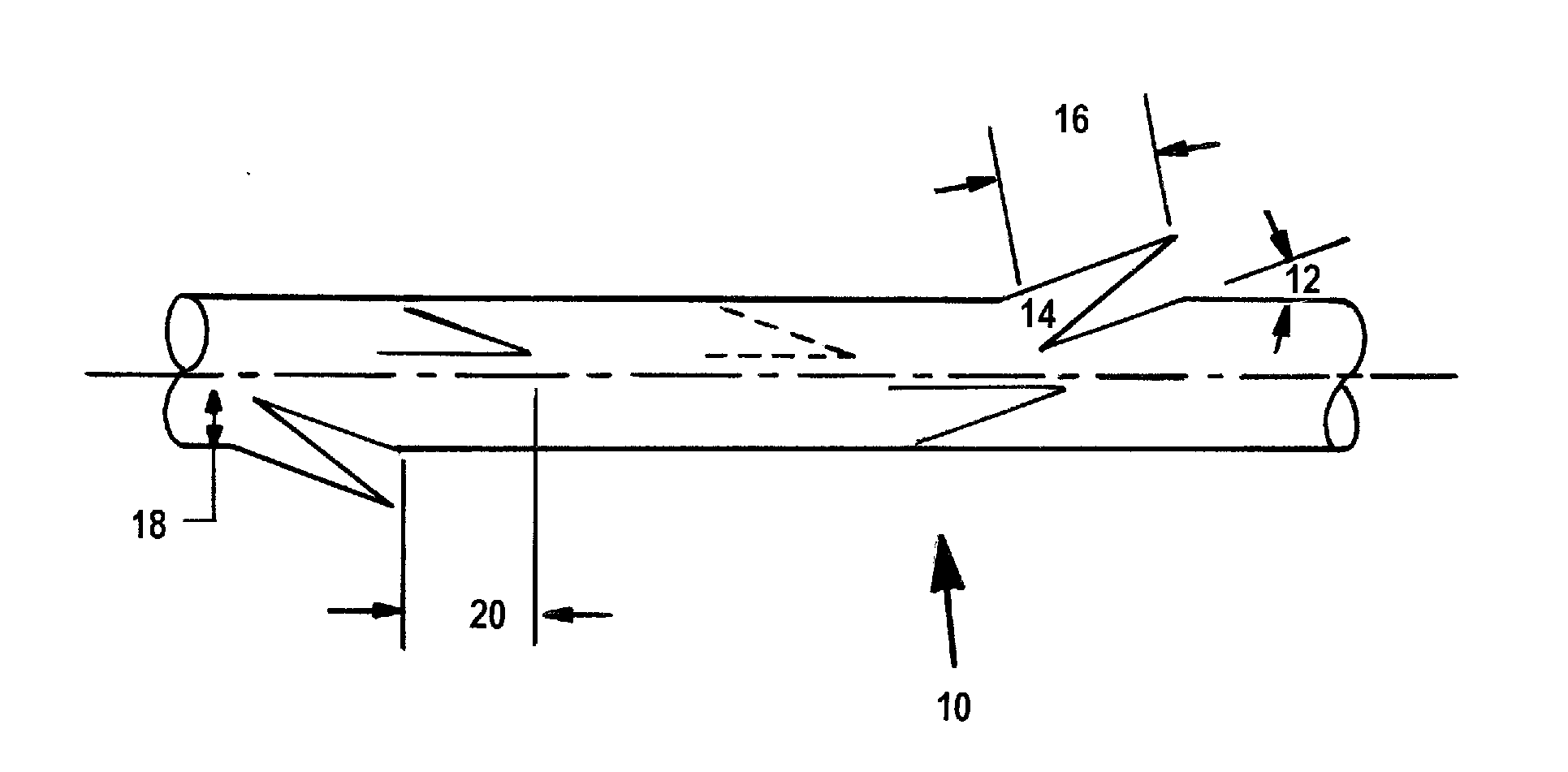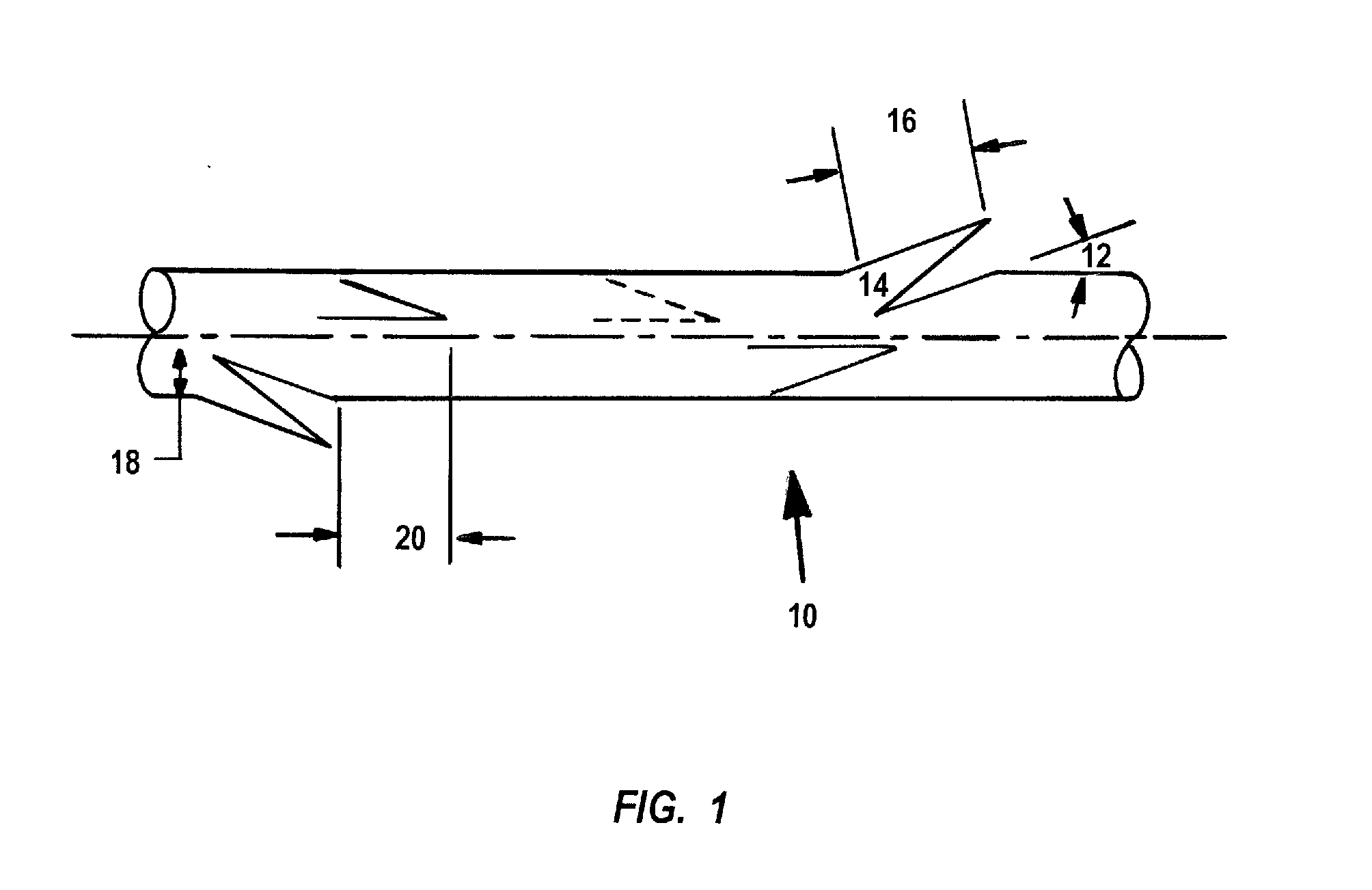Self-retaining sutures of poly-4-hydroxybutyrate and copolymers thereof
- Summary
- Abstract
- Description
- Claims
- Application Information
AI Technical Summary
Benefits of technology
Problems solved by technology
Method used
Image
Examples
example 1
Extrusion of High Strength P4HB Monofilament
[0115]Bulk P4HB resin in pellet form was dried to under 300 ppm water using a rotary vane vacuum pump system. The dried resin was transferred to an extruder feed hopper with nitrogen purge to keep the pellets dry. The pellets were gravity fed into a chilled feeder section and introduced into the extruder barrel, which was 1.50 inches in diameter and fitted with an extrusion screw with a 30:1 L / D ratio. The extruder barrel contained 5 heating zones (or extrusion zones)—zones 1, 2, 3, 4 and 5, and was manufactured by American Kuhne. The heated and softened resin from the extruder was fed into a heated metering pump (melt pump) and from the melt pump the extruded resin was fed into the heated block and an eight-hole spinneret assembly. Processing profile ranges from 40° C. to 260° C. for temperatures, and 400 psi to 2000 psi for pressures, were used. The molten filaments were water quenched and conveyed into a three-stage orientation, before ...
example 2
Preparation of an Oversized Size 3 / 0 High Strength P4HB Self-retaining Suture Meeting USP for Knot Strength
[0117]A high strength oversized size 3 / 0 poly-4-hydroxybutyrate monofilament, with a diameter of 286 μm, tensile strength of 6.9 Kgf, elongation to break of 25%, and a Young's Modulus of 1.8 GPa, was mechanically cut to form a self-retaining suture. The monofilament was cut using an angle of 21.8 degrees measured relative to the longitudinal axis of the monofilament fiber (as shown in FIG. 1), and the depth of the cut (measured perpendicular to the longitudinal axis of the monofilament fiber) was 120 μm. The length of the cut was 300 μm. The cuts were spaced at a distance of 300 μm apart with each successive cut offset from the prior cut at an angle of 120 degrees around the circumference of the fiber. The density of cuts was 33.3 per cm of monofilament length. After cutting, the self-retaining monofilament fiber had a tensile strength of 2.5 Kgf, elongation to break of 22%, an...
example 3
Preparation of a Size 2 High Strength P4HB Self-retaining Suture Meeting USP for Knot Strength
[0119]A high strength size 2 poly-4-hydroxybutyrate monofilament, with a diameter of 584 μm, tensile strength of 26.1 Kgf, elongation to break of 28%, and a Young's Modulus of 1.3 GPa, was mechanically cut to form a self-retaining suture. The monofilament was cut using an angle of 21 degrees measured relative to the longitudinal axis of the monofilament fiber (see FIG. 1), and the depth of the cut (measured perpendicular to the longitudinal axis of the monofilament fiber) was 230 μm. The length of the cut was 600 μm. The cuts were spaced at a distance of 600 μm apart with each successive cut offset from the prior cut at an angle of 120 degrees around the circumference of the fiber. The density of cuts was 16.6 per cm of monofilament. After placement of the retainers, the self-retaining monofilament suture had a tensile strength of 7.7 Kgf, elongation to break of 27%, and a Young's Modulus o...
PUM
| Property | Measurement | Unit |
|---|---|---|
| Temperature | aaaaa | aaaaa |
| Temperature | aaaaa | aaaaa |
| Length | aaaaa | aaaaa |
Abstract
Description
Claims
Application Information
 Login to View More
Login to View More - Generate Ideas
- Intellectual Property
- Life Sciences
- Materials
- Tech Scout
- Unparalleled Data Quality
- Higher Quality Content
- 60% Fewer Hallucinations
Browse by: Latest US Patents, China's latest patents, Technical Efficacy Thesaurus, Application Domain, Technology Topic, Popular Technical Reports.
© 2025 PatSnap. All rights reserved.Legal|Privacy policy|Modern Slavery Act Transparency Statement|Sitemap|About US| Contact US: help@patsnap.com


